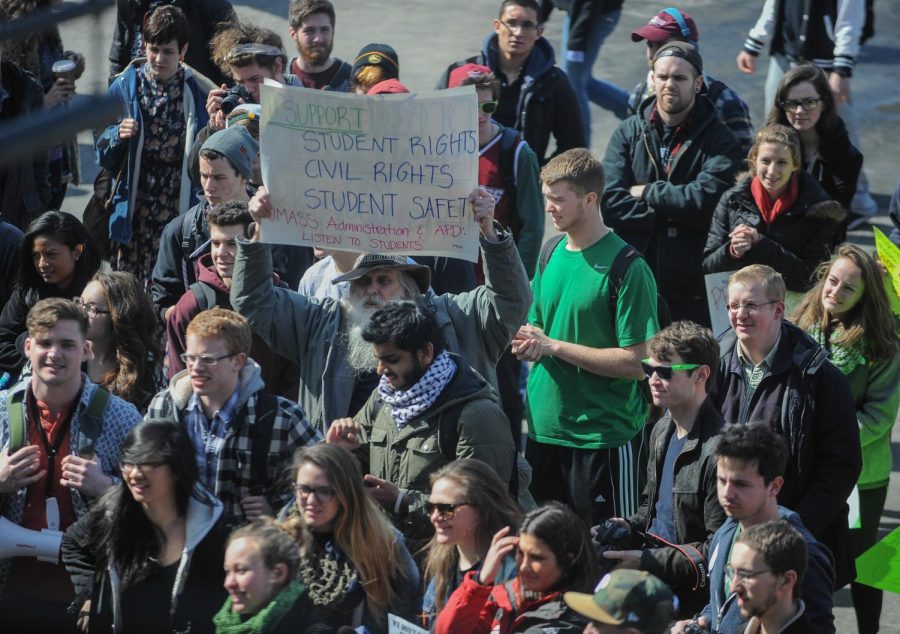A conservative student group, Young Americans for Liberty, is suing the University of Massachusetts because they claim that UMass allowing only one hour for demonstrations and rallies at only one location is too restrictive. Institutions like UMass can legally restrict the time, place and manner of speech as long as they leave some outlet for it to exist, and meet other standards like content neutral regulation. When I read about this story, I considered the legal case for a free speech zone and the University’s right to regulate speech. That issue will be settled in court, but regardless, this is a terrible policy.
The University responded to the lawsuit through spokesperson Ed Blaguszewski, who said, “These policies provide a substantial opportunity for public speech while allowing the campus community to continue to conduct academic, business and other activities.”
The University is beyond disingenuous if it considers one hour in front of the Student Union to qualify as a substantial opportunity. What interest could the University possibly have for such broad denial of public assembly across campus, or at the Student Union during other time slots?
UMass’ mission statement includes the line, “to conduct programs of research and public service that advance knowledge and improve the lives of the people of the Commonwealth, the nation, and the world.” This university should be, among other things, a proving ground for the next generation of public servants. The student body does an admirable job of chasing this dream. I helped organize the student campaign office for Bernie Sanders’ presidential campaign in 2016. Imagine my surprise when I learned that between our group, the University Democrats and Republicans, the Independent Socialist Organization and a handful of other groups, we collectively had one hour to organize per day. To navigate this nightmare, we planned our rallies and tabling events months in advance. We never wanted to lose out on the only legal venue on campus to another organization advocating Hillary Clinton, Donald Trump or anyone else. But the one-hour time limit and the requirement that all demonstrations be located at the Student Union made compliance with university policy difficult.
Officially, students could face expulsion for violating this policy. Inside the Sanders campaign, our answer to that was, “They can’t expel all of us.” To work around the draconian speech policy, we simply ignored it. We did schedule our rallies with the University in advance, but we blatantly violated the time limit and didn’t constrain our work to the pavement in front of the Student Union. We also violated the student life policy by going door-to-door in residence halls, where we didn’t live, to register students to vote and talk to them about our candidate. If we had tried to run a campaign within the University’s guidelines, we would have reached a quarter of the students we did. Several of the rallies we held would have been cut short, which would have denied students and faculty members the right to speak and assemble publicly.
In January and February of 2016, the University was happy to host Senator Sanders twice for formal campaign rallies in the Fine Arts Center and the Mullins Center. They were happy to sell concessions and get good press in the Boston Globe. They were happy to host high school students who might see the University as an opportunity to engage in political activity if they attended as students. These events happened because our campaign office repeatedly invited Senator Sanders and promoted both events. Ironically, both events would have violated the campus free speech policy, but technically, since they weren’t organized by students, the University allowed it. I helped the FAC event staff manage the sold-out crowd in January, and I don’t expect a notice of my expulsion from UMass any time soon.
A one-hour limit at one location is incompatible with the spirit of time, place and manner restrictions. Institutions sometimes have good reasons to regulate speech. Students aren’t asking to loudly demonstrate at 3 a.m. on a Tuesday in Southwest Residential Area, not that anyone is getting any sleep in the towers anyway. We’re not asking to block walkways, occupy construction sites or barricade offices. There’s a case to be made for completely unrestricted speech, but there is no justification for the opposite—a punitive and condescending policy that tells students not to bother demonstrating at all.
What does the university fear from allowing students to organize in front of Whitmore Hall at 11 a.m. on a weekday? Is that so egregious that students would be violating multiple rules and should face expulsion? Of course not. The administration should support student activists, not impede them. On campus, countless groups give up their precious free time to raise money for causes like feeding the homeless or collecting school supplies for underprivileged students. An affiliation with an activist group means that students will spend their time doing something other than drinking their undergraduate years away. The University benefits from all of this work.
This campus is, and must continue to be, a gathering place for activists. It’s now up to the University to decide if it will continue stifling the next generation of public servants it claims to be developing.
William Keve is a Collegian columnist and can be reached at [email protected].



















john aimo • Feb 1, 2018 at 10:53 am
There is one simple solution..rebellion.
Don’t plead with the administration, don’t file a petition, don’t ask for their permission, don’t even file a lawsuit.
Just go out and protest, whoever wants to protest should just do it, at any time they want for however long,anywhere and if they get shut down, then they should come back with a protest twice as big.